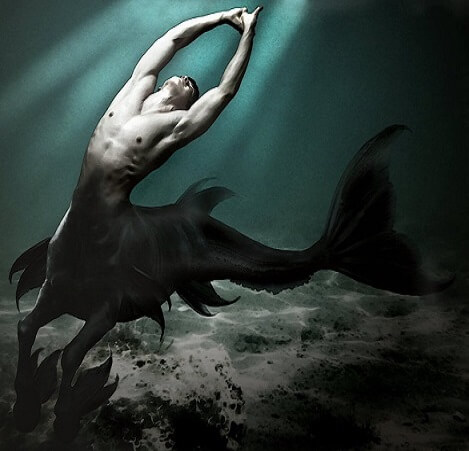Ichthyocentaurs
The Astronomical Constellation Pisces
These were a pair of centaurine sea-gods with the upper body of a man, the lower front of a horse, and the tail of a fish.
They were set in the sky as the astronomical constellation Pisces.
ICHTHYOCENTAURUS (Ichthuokentauros), that is, a fish-centaur, or a particular kind of Triton. Ichthyocentauri were fabulous beings, the upper part of whose body was conceived to have a human form, and the lower that of a fish, while the place of the hands was occupied by a horse\'s feet. They differed from the ordinary Tritons by the fact that the latter were simply half men and half fish, and had not the feet of horses. (Tzetz. ad Lycoph. 34, 886, 892.)
[1]
The twin Ikhthyokentauroi appear together in several works of art. The two sea-gods also appear in a pair of matching sculptures (belonging to the Louvre and Vatican Museums) depicting them carrying Seilen (Silen) companions of the god Dionysos, after his company was driven into the sea by the Thrakian king Lykourgos (Lycurgus). Triton and other sea gods were sometimes also depicted in ancient mosaics as Ikhthyokentauroi.
Little is know of these two gods, except what can be deduced from their depictions in art, and a brief reference in the Byzantine lexicon of the Suda. Aphros was here described as the first King of the sea-going Aphroi (Carthaginians). A mosaic uncovered in Tunisia (Z2.4) (in the region of ancient Carthage) confirms this statement. It depicts a pair of African sea-gods swimming alongside Poseidon's chariot: one is the Ikhthyokentauros Aphros eponym of the Aphroi, and the other a twin-tailed Triton, god of the Libyan lake Tritonis. Another mosaic (Z33.1), from Paphos in Cyprus, depicts Bythos alone (named) carrying the Nereis Thetis, in the company of two other Nereides: Doris and Galateia.
Pseudo-Hyginus, Fabulae 197 (trans. Grant) (Roman mythographer C2nd A.D.) :
"Venus [Ashtarte]. Into the Euphrates River an egg of wonderful size is said to have fallen, which the fish rolled to the bank. Doves sat on it, and when it was heated, it hatched out Venus [Aphrodite], who was later called the Syrian goddess [Ashtarte]. Since she excelled the rest in justice and uprightness, by a favour granted by Jove [Zeus], the fish were put among the number of the stars [as Pisces], and because of this the Syrians do not eat fish or doves, considering them as gods."
[N.B. These fish appear to be the original Syrian form of the late classical Ikhthyokentauroi.]
Suidas s.v. Aphroi (trans. Suda On Line) (Byzantine Greek Lexicon C10th A.D.) :
"Aphroi (Africans): Name of a people; the Karthaginians (Carthaginians). [They are descended] from Aphros who was king of Libya, the son of Kronos (Cronus) by Philyra".
Further Sources
[1] Dictionary of Greek and Roman Biography and Mythology.
Hyginus, Fabulae - Latin Mythography C2nd A.D.,
Suidas - Byzantine Greek Lexicon C10th A.D.,
"Theoi"













